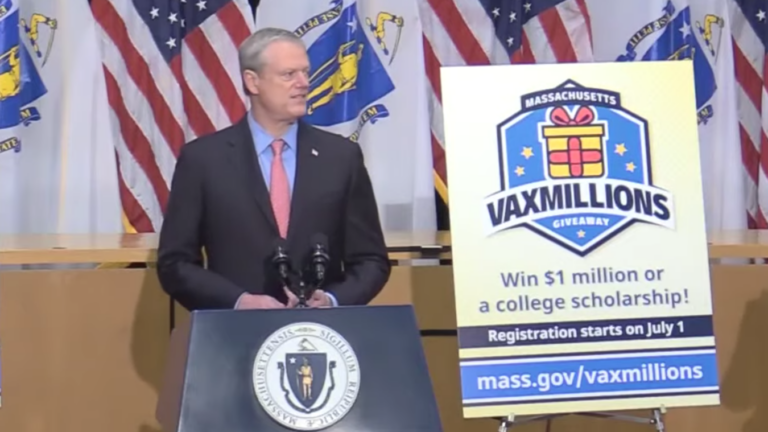Massachusetts announces vaccine lottery with five $1 million payouts
This summer, the lottery will offer the chance to win $1 million or a $300,000 college scholarship — but only to residents who are fully vaccinated.

Massachusetts is giving unvaccinated residents a million reasons to get their shots.
In an effort to boost vaccinations, Gov. Charlie Baker announced a new “Mass VaxMillions” lottery, offering fully vaccinated residents the chance to win one of five $1 million payouts or $300,000 college scholarships.
Beginning on July 1, any Massachusetts resident who has gotten both doses of the two-shot Pfizer or Moderna vaccines, or one shot of the single-dose Johnson & Johnson, will become eligible to register for the giveaway on the state’s website.
Fully vaccinated residents who are 18 or older will have a chance to win one of the five $1 million prizes, while those between the ages of 12 and 17 will be eligible to win one of five $300,000 scholarship grants (the scholarship grants come in the form of a state-managed 529 college savings plan account).
“If you’re not vaccinated, you can’t play,” Baker said during a press conference.
However, he noted that “entries can be submitted on a rolling basis,” meaning that there’s time for residents to get fully vaccinated before winners are randomly selected this summer.
Drawings will run once a week for five weeks, from Monday, July 26 through the week ending Friday, Aug. 27. The last day of registration is Aug. 20.
Winners will be required to provide verification, such as their vaccination card or other documentation, to prove that they received their shots. Individuals also have to be legal permanent residents of Massachusetts — and must have gotten the vaccine in Massachusetts — to be eligible.
“If you’ve been sitting on the sidelines and thinking about getting vaccinated, but for whatever reason haven’t, here’s another reason for you to come forward, protect yourself, your friends, your co-workers, and your neighbors by getting vaccinated here in the commonwealth,” Baker said.
The initiative is the state’s latest — and perhaps most grandiose — attempt to entice residents into getting vaccinated.
With more than 80 percent of Massachusetts adults at least partially vaccinated (which is one of the highest rates in the country), Baker’s administration has mostly continued to focus on making shots convenient and accessible in the lower-income communities that were hardest hit by COVID-19 — and where vaccination rates have generally continued to lag behind the rest of the state.
Still, officials have begun introducing smaller incentives, such as grocery store gift cards, museum tickets, and free Dunkin’ iced coffee. And two weeks ago, state Treasurer Deb Goldberg’s office, which oversees the Massachusetts Lottery, said it was conducting initial research on the effectiveness of vaccine lotteries in other states.
Baker said Tuesday that he had a “long conversation with Ohio Gov. Mike DeWine,” whose state was one of several that launched a vaccine lottery and saw a “significant increase in vaccine signups after they put this program in place.”
With over 4.7 million people in Massachusetts — or nearly 70 percent of all residents — already at least partially vaccinated, Baker noted that the Bay State has to close a “slightly smaller window” than peer states where there was more vaccine hesitancy.
Baker also said his administration talked to officials in California, which held a vaccine lottery with prizes ranging from $50 gift cards to a $10 million jackpot.
“Ohio was significantly lower than we were in terms of the number of people they had vaccinated when they did this, but it did create a sustained increase over several weeks — I mean, I think it was almost a month,” Baker said.
“Now if we could get that, that would matter a lot,” he added. “That could be worth hundreds of thousands of people.”
Baker said that Ohio saw an especially significant increase in vaccination rates among young men, “which is a tough population for us as well,” along with parents who used the scholarship program as a way to encourage their children to get vaccinated.
Massachusetts state officials are also working to set up a call center to help those without internet access sign up for new lottery. Baker said more details about the entire signup process will be shared before the July 1 launch.
The Massachusetts State Lottery will select winners of the VaxMillion programs using a random number generator, which assigns a number to each of the individual entrants. For each prize, the Lottery will also select a group of alternates in case the initial winner is found to be ineligible.
Officials noted that winners who accept the prize will have their names made public and potentially used in VaxMillions promotional materials — as is common in many lottery programs.
Baker suggested Tuesday that the state will use federal COVID-19 relief funds from the American Rescue Plan to finance the lottery program.
“This is a purpose that the [U.S.] Treasury has said, in D.C., that you can spend ARPA money on, and we talked to the legislature about that,” the governor said.
Marylou Sudders, the state’s health and human services secretary, said Tuesday that the administration is “overall pleased” with the vaccination rates in Massachusetts, though the percentage of Black and Latino remains below 50 percent, lagging behind their white counterparts. Sudders said the state plans to continue to target under-vaccinated areas with their in-home and mobile programs “through the summer.”
While the state’s mass vaccination sites are beginning to close, Baker’s office noted Tuesday that there continue to be over 900 vaccine providers across Massachusetts, “with appointments and walk ins widely available.”
Baker also announced Tuesday that Massachusetts had surpassed 4 million fully vaccinated residents.
Creeping close to the state’s original goal of fully vaccinating 4.1 million residents, Baker declined to pinpoint a new target number.
“More,” he said. “The new number is more.”